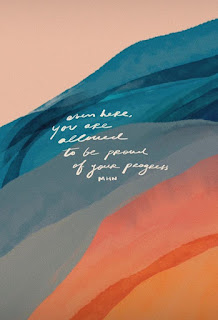Keeping track of my progress while recovering from a life threatening battle with anorexia and addiction.
Saturday, December 18, 2021
I ditch the diet
Monday, December 6, 2021
I take a self-compassion break
Recently, upon arriving at work, the first thing my coworker said to me was, “OMG. I got so drunk last night. I think I am still drunk right now. Hahahaha.” My eyes got wide as I stared at her with an angry and judgmental gaze. Unable to respond, I walked away and cried alone in a nearby janitor’s closet.
Monday, November 22, 2021
I practice comfort and joy
Thursday, November 18, 2021
I welcome the What If's
One of my biggest fears is re-entering the working world sober. I just got a call for my first interview since beginning my sobriety journey; and instantly, my brain began scheming ways to get my hands on some booze ASAP.
Monday, November 8, 2021
I am proud of myself
Wednesday, October 27, 2021
I trade shame for compassion
Letting Go of Thinness as a Moral Claim
Thursday, October 14, 2021
I no longer strive for past versions of myself
Wednesday, October 6, 2021
I light a candle
Monday, September 20, 2021
I redefine showing up
Whenever I think of Glennon Doyle’s earlier work, these words echo between my ears, “Just show up, Glennon. All you have to do is show up and do the next right thing.”
Wednesday, September 15, 2021
I am worthy of rest
Tuesday, September 7, 2021
I seek compassion for myself and others
Saturday, August 21, 2021
I play the tape through
Monday, August 9, 2021
I create my own magic
Monday, August 2, 2021
I am worthy of forgiveness right now
Tuesday, July 20, 2021
I create space to fill my summer with joy
Wednesday, July 7, 2021
I am bringing my voice along for the ride
Monday, July 5, 2021
I have the power to rewrite my story
A few years ago while finishing school, I took an adolescent psychology class. I almost fell out of my chair while reading about a theory stating that kids develop an ideal self and a feared self. I took a screenshot of it on my phone:
“The ideal self is the person an adolescent would like to be (for example: an adolescent may have an ideal of becoming highly popular with peers or highly successful in athletics or music). The feared self is the person the adolescent imagines it is possible to become but dreads becoming (for example: an adolescent might fear becoming an alcoholic, or fear becoming like a disgraced friend or relative).”
A few months later, after spending an entire semester drunk, I went to rehab for the first time. Then, five days after being discharged, and on my way home from an AA meeting, I got my second DUI. Now my criminal record was filled with more black and white proof I should be feared.
For a very long time it felt like the universe was saying there was something wrong with me. I was the one who needed to be sent away and monitored 24/7. I was the one who could not handle life.
My relationship with alcohol didn’t change until I realized I have the power to rewrite that, “Hi my name is Kelsi, and I should be feared” story. That story is what kept me entangled in addictive patterns for over a decade. It helped to welcome all parts of myself, rather than emphasizing my perceived weakness.
Now, after months of filling my life with Tempest material and brightly colored pens, I have rewritten the story in my head. It goes like this:
“My name is Kelsi and I am not afraid of myself. Sure, I’m awkward, emotional, quiet, and often overstimulated, but I’m also kind, creative, intelligent, and loved. I am someone who courageously and imperfectly challenges society’s view of what it means to struggle with alcohol.”
I have the power to rewrite my story.
Sunday, July 4, 2021
I am free to bloom

































